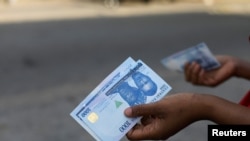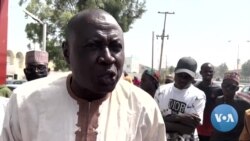For years, Rotimi Bankole, 54, struggled to take care of his family of five while doing two jobs.
Recently, he took on a third job -- driving a taxi -- but still that could only make an extra 5,000 naira ($11), which is insufficient in a country where the cost of living has reached record highs.
"Nigeria has been so difficult to cope and live in," Bankole said. "Survival has been tough."
Africa's largest economy and the continent's top oil producer, Nigeria has resources and wealth, but the global pandemic and the economic fallout from the Ukraine war hit the country hard in Buhari's last term.
Inflation is at 21.8 percent, the naira currency has weakened and the World Bank says more Nigerians are now living below the poverty line.
Compounding economic hardships, the country has been hit with fuel shortages and also a scarcity of cash after the central bank began to swap old naira notes for new bills.
A chronic shortage of cash has created lines outside banks and triggered protests in some cities, even as the central bank says the policy is needed to curb the amount of cash outside the banking system.
Bankole started driving a taxi two months ago, but the recent major fuel and cash scarcity has compounded his misery.
He spends long hours on queues at petrol stations, paying as much as 330 naira ($0.72) for a liter as against 165 ($0.36) previously.
Even running his school has been tough as parents struggle to pay fees while his printing business is struggling.
"We cannot continue like this as a people," he said.
Nigeria’s unemployment rate is about 33 percent while the number of Nigerians living in poverty rose to 133 million or 63 percent of the population in 2022, according to the World Bank.
Youth unemployment now stands at 43 percent, compared to 10 percent prior to Buhari's first administration in 2015.
"This situation is not good for anyone, the industry, the government and the ordinary citizen," said Segun Ajayi-Kabir, the head of the Manufacturers Association of Nigeria (MAN)
"You will have a compounded crippling lack of patronage for the domestic manufacturer; the denial of government revenue that would have accrued from consumption taxes and the disruption of the daily life and needs of the average Nigerian," he added.










